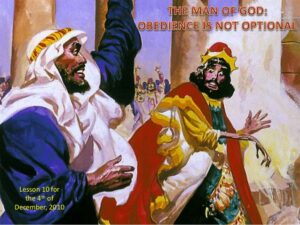1 Kings 13:1-10 Caught Dead Handed

Jeroboam goes to worship at the altar of his false god. God does NOT approve and sends him a sure word. Jeroboam is caught ‘dead handed’ in his sin.
The people are being led farther and farther away from God. When God had Ahijah tell Jeroboam that he would have ten of the tribes of Israel to rule, He KNEW where Jeroboam’s heart was. This disgraceful act did NOT surprise God in the least. But He was not going to let it go unchallenged.
I find it interesting that the man of God spoke to the altar instead of to Jeroboam. Why did God do it this way? In doing so God isn’t pointing a finger directly at anyone but at the articles of worship and the act of worshiping other gods.
The judgment pronounced against the altar was a LONG way off. It would happen after the fall of the northern tribes; Israel. Josiah was the last free king of Judah and the last of the godly kings. We see his story in 2 Kings 22-23.
The things prophesied about the altar were shocking, to say the least. Jeroboam had built this altar and one other in Dan to be a substitute for the people. Did he actually believe his own hype? Did he believe that the stones before him had any power, let alone significance in this world? Did he truly believe them gods? Was his reaction one of anger or fear? THE God of Israel had sent a word that what he had built was going to be torn down. Not just torn down but desecrated.
Let’s watch as the scene unfolds that day.
♥ ♦ ♥
Jeroboam woke before the sun. This was his day of sacrifice. Today he will offer sacrifices for strength and direction upon the altars he has set up.
Relations with the southern tribes is heating up. There is talk of war. Jeroboam has been fortifying Shechem but what of the regions closer to king Rehoboam? Will he attack them? What forces will he be able to marshal against Jeroboam’s? Which side will the Lord fight on? Both are the people He called out of Egypt. But Jeroboam has worked long and hard to put distance between the people and the Lord. Surely his new gods will protect him.
The stewards ready Jeroboam’s sacrifice as he enjoys his morning meal. Jeroboam hears the bleating of sheep as they are tended to in the pen reserved for sacrificial animals. They must be clean and in good health to be a worthy sacrifice. Once his appetite is satisfied he washes his hands and face, straightens his robes and calls for his servants.
“It is time to depart. Are the animals ready?”
“They are my king. They have eaten and the evidence of the night’s sleep has been removed from their coats.”
“Good. We will leave at once. Bring my chariot.”
The servant hurries from the hall and within minutes Jeroboam’s chariot is standing before the door of his palace. Displaying no haste, Jeroboam steps through the doors and walks to his chariot. Once safely aboard, the driver signals the horses. The procession will be slow as the sheep cannot move as fast as the horses. They should arrive at Bethel by midday. Jeroboam likes to conduct his sacrifices when the sun is at its highest. He believes that his prayers will reach further into the heavens at this time of day than any other.
The journey is uneventful. No spies are observed. The people they pass pay their king due respect. Even the sheep are staying in step, requiring little from their shepherds besides a direction to walk.
As the group arrives in Bethel, Jeroboam steps down from his chariot and begins directing his men. Most of them have participated in Jeroboam’s sacrifices before so little instruction is needed. The king likes to be the one to wield the knife in his sacrifices. The priest of the altar will take the slain animal and dress it for the altar afterwards.
The sheep are in line, awaiting their fate. Jeroboam stands with knife in hand while the first of the 20 are brought to him. Jeroboam’s eyes are trained on the sheep and the servant leading it to him. Jeroboam lays hold of the first sheep by the back of its neck and moves toward it with the knife he holds. Something catches his attention and he freezes in mid act.
A man has stepped up to the side of the altar. How dare he! This is the king’s time of sacrifice. All others know to wait reverently. And out of the way!
The man doesn’t even turn to acknowledge king Jeroboam. He begins speaking directly to the altar after first spitting on it!
“O altar, altar, thus says the Lord:…”
At these words the blood drains from king Jeroboam’s face. He isn’t able to even blink as he listens to the words the man is speaking.
“…’Behold, a son shall be born to the house of David, Josiah by name, and he shall sacrifice on you the priests of the high places who make offerings on you, and human bones shall be burned on you.’” The man paused and turned to look directly at king Jeroboam before speaking again. “This is the sign that the Lord has spoken: ‘Behold, the altar shall be torn down, and the ashes that are on it shall be poured out’” (verses 2b-3).
After the initial shock had faded, Jeroboam became angry. How dare the man invoke the name of the Lord in this place! This was not His altar and they were no longer His people. Jeroboam addressed the guards who had accompanied him on his journey.
“Seize him!” As he spoke he also flung out his arm indicating the man he wished his guards to forcefully take. As his hand and arm extended through the air it became as rigid as stone. Jeroboam could not move his fingers; nor bend his wrist, elbow or shoulder. His arm also took on the appearance of a dried fig.
Fear gripped Jeroboam tight and his anger was forgotten. His guards had seen the events and were afraid to go near the man for surely he was a man of God. They feared what the Lord would do to them if they obeyed their king’s command. They might have feared their king and disobeying his order but between the two options, it was safer to stand still and wait.
The man of God held his place. He didn’t retreat or turn his head to take in the guards. He waited, with his gaze fixed on Jeroboam. While everyone stands frozen in place a bolt of lightning rips through the air and strikes the altar. One side of it crumbles to dust and the ashes that it contained poured onto the ground like water.
The priest and the guards fled in fear, the servants fell on their faces and the sheep scattered. King Jeroboam was left alone standing before the man of God, with his arm still outstretched. Tears began to pour down Jeroboam’s face,
“Entreat now the favor of the Lord your God, and pray for me, that my hand may be restored to me” (verse 6b).
The man of God nodded his head and began to pray. “Lord God of Abraham, Isaac and Jacob. Your name is above all other names and there is no God but You. Show Your power and mercy by restoring what You have taken from the king You have set over a portion of Your people. Not as his actions have earned but as a testament to Your sovereign will and might.”
King Jeroboam’s hand and arm immediately returned to its healthy state. Jeroboam drew his arm in and clasped it to his breast. He fell to his knees in relief. The man of God waited quietly as Jeroboam composed himself. After a few minutes Jeroboam rose to his feet, straightened his robes and addressed the man of God again.
“Come home with me, and refresh yourself, and I will give you a reward” (verse 7b).
The man of God shook his head as he answered. “If you give me half your house, I will not go in with you.” A look of determination steeled his face as he continued. “And I will not eat bread or drink water in this place, for so was it commanded me by the word of the Lord, saying, ‘You shall neither eat bread nor drink water nor return by the way that you came’” (verses 8b-9).
With these words the man of God turned and walked away from the altar, king Jeroboam, and all who remained. Jeroboam did not challenge him as he left nor call out after him to remain. Instead, he called to his servants who remained. “Gather the sheep. We return to Shechem. There will be no sacrifice today.”
♥ ♦ ♥
NO ONE is beyond the reach of God. No, Jeroboam didn’t turn back to God after this encounter but he was given absolute proof that his gods were nothing more than wood and stone. They held no power to save. God also showed that He was looking to the future. There will be a time when Israel returns to Him. He is patient but He also requires justice. There will be a LOT of payment for Jeroboam’s rebellion extracted from the people.
Father God, thank You for showing me the story. I was having trouble with the altar being torn down part and didn’t really see it until Your Spirit helped me put it in the story. Jeroboam got two signs that day. If he was smart he would have heeded them. But that wasn’t part of Your overall plan.



